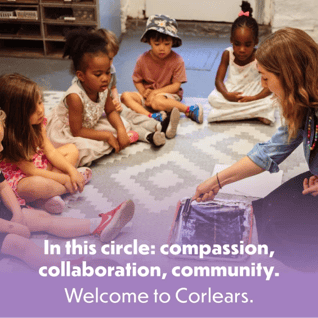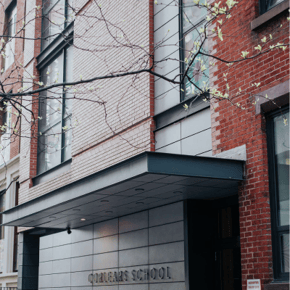One of the most important things you can do as a parent to help your child transition into elementary school is to ensure they are set up for success in Kindergarten and beyond. This checklist, developed by early childhood and elementary educators at Corlears School, covers communication, social emotional, cognitive, and academic readiness — and how you can support growth in these areas, too.
The transition from PreK to Kindergarten is a big milestone — both for children and their families. As kids move into Kindergarten, there are new expectations for their academic, social, and emotional development.
“As children prepare for Kindergarten, families are encouraged to focus on the person they are
and assess readiness through the lens of autonomy, agency, and advocacy as necessary skills to navigate the demands of a Kindergarten classroom,” explains Brenda Daniels, Elementary Division Director at Corlears School.
To help ensure your child is ready for this exciting new chapter, here’s a checklist of key skills to look for before they walk through the classroom door.
Kindergarten Readiness Guide: Key Skills for Success
1.) Follows Multi-Step Directions
School is full of multi-step tasks and so is life. Being able to remember a set of instructions — and finish a task fully — is an important skill. So is being able to take direction from another person.
How to work on this skill: Observe your child and check their ability to listen to a set of directions, follow-through, and to complete a task. Continue to work with them on this skill by offering multi-step directions. Example: “Take off your coat, put it in the closet, and join me at the table.”
2.) Asks Non-Family Adults for Help
There are lots of adults in school and being able to ask for help, talk to, and listen to them is an important aspect of Kindergarten readiness. Problems arise at school and oftentimes outside of the primary classroom. Your child being comfortable with going up to an adult (whom they might only vaguely know) is a critical skill.
How to work on this skill: Encourage your child to talk to adults and advocate for their needs. Ordering at a restaurant or saying hello to people who work in your apartment building or neighborhood are helpful ways to practice!
3.) Uses Problem-Solving Strategies with Peers
It's easy when a parent is around to walk right up to them whenever there's an issue, have them swoop in with solution ideas, and magically fix it. But that's not how school or the real-world works. Our children need to have a toolbox of ideas for how to solve a problem with a peer before they need adult intervention.
How to work on this skill: When presented with opportunities at the playground, playdates, and parties, coach your child to try to solve peer arguments or disagreements with friends. Stories are a great way to talk through ideas and suggestions, which will help build their awareness and capacity for how to try to solve peer problems before asking for help.
4.) Asks Questions to Clarify and Learn
Curiosity is a core value at Corlears. We encourage children to explore their curiosities and seek information. Make sure your child is asking questions, especially for clarification if they don't understand something, while also being motivated to discover new information.
How to work on this skill: Creating an environment where questions are welcome and explored will encourage and support your child in engaging in inquiry-based learning at school. Some example questions might include:
- What do you wonder about …?
- What do you notice about …?
- I wonder why…?
- What else might have caused…?
5.) Takes Turns with Shared Toys
At school, most materials and equipment are communal; items do not belong to any one child. For the school setting, turn-taking is encouraged and taught in the Early Childhood years. Being able to ask for a turn and wait for a turn, without acting on our impulse to grab or take a material from another child, is a critical skill. Also, being able to recognize when someone is waiting for a turn is helpful to ensuring your child develops empathy and compassion for their peers.
How to work on this skill: At home, where toys may have a clear “owner,” it is helpful for your child to get comfortable taking turns with a peer during a playdate, a sibling, or even with you! We offer more tips on developing this skill on our blog post here.
6.) Copes with Disappointment
At school, there will be moments where a child has to deal with the disappointment of something not working out, not going their way, or losing a game. Learning to express disappointment and cope with feelings of disappointment are essential life skills.
How to work on this skill at home: Don't let them win at games every single time. They will not win at everything in school and that is a hard lesson to learn with 15 other kids in a class. In life, we don't always win or get our way. Resilient children know that failing happens, failing isn't the end of the world, and that failing means you get to try again. Help your child learn strategies to handle the disappointment and understand that failure isn't a reflection of who they are as a person.
7.) Listens Without Interrupting
There is more direct instruction in Kindergarten, which places a higher demand on children to listen and pay attention.
How to work on this skill at home: Read picture books at home and ask them to wait until the end for questions. Try reading a chapter book without pictures to get them really in the “sit and listen” mode. Limit screen time to help children grow a longer attention span.
8.) Engages in Independent Play
The school schedule has its ebbs and flows. Not every aspect of the school day will pique your child's energy and interest in the same way. All children get bored at school from time to time, regardless of their academic skill level. A child who is bored is not necessarily an unchallenged child or a gifted child; part of what contributes to the feeling of boredom is the missing skills to self-entertain and play independently.
How to work on this skill at home: Children need to recognize these feelings and have an ability to self-entertain, or keep themselves occupied when the going gets slow. A great way to practice this is by limiting screens that do the work for the child, thus creating opportunities for them to entertain themselves while they wait.
9.) Makes Decisions Independently
Kindergarteners are expected to be more independent and have skills to navigate the day with less scaffolding from adults. Kindergarteners have a lot of independence. Help your child learn to feel comfortable in the role of being the leader of their own life.
How to work on this skill at home: Let them make their own decisions – even if this means they fail. They'll learn from that. Give them two or three options to choose from when possible, like letting them decide simple parts of their day (“which shoes would you like to wear?”). Or, stand back a little and let them navigate a new area. You're still watching and supervising, but maybe doing it from the park bench instead of standing right beside them.
Giving Your Child a Strong Start
We hope that you will find this checklist supportive as you help prepare your child for Kindergarten.
At Corlears, children in our PreK program practice and develop the skills necessary for Kindergarten through a dynamic curriculum that fosters growth in all the key developmental areas. Through sensory-rich activities, thoughtfully designed classroom stations, and child-led exploration, our students learn in a school environment aligned with New York State-recognized standards in early childhood development. To learn more about Corlears for early childhood, PreK, Kindergarten, and beyond, visit our program overview.



